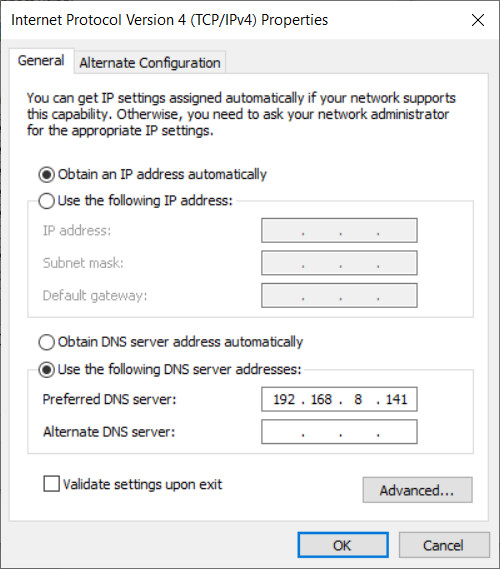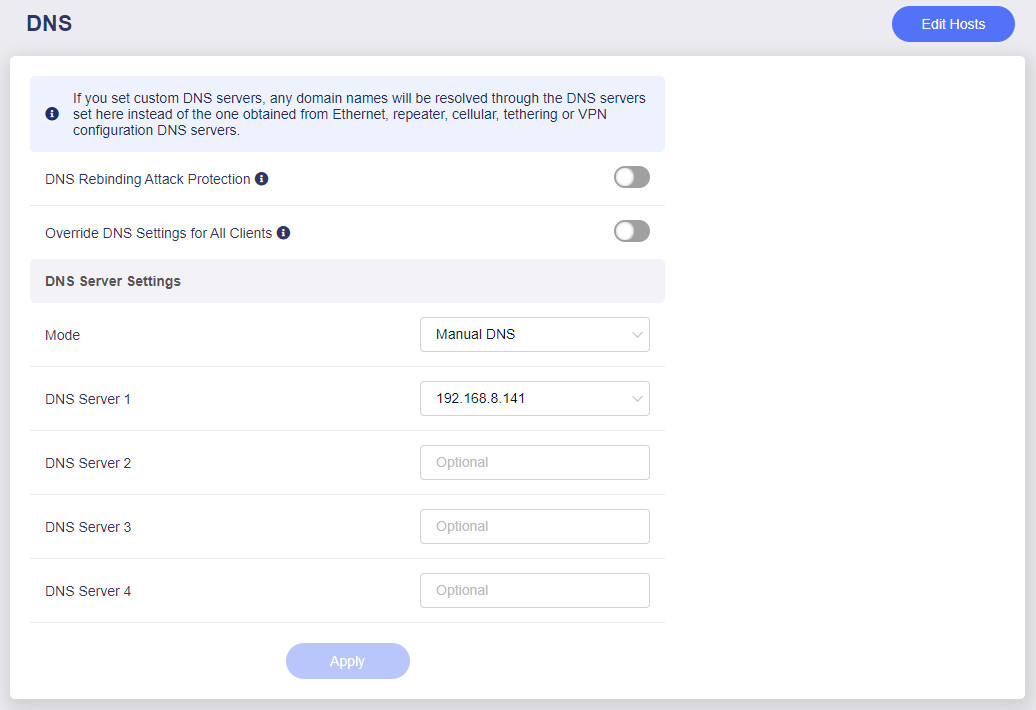Getting up to speed with pi-hole
This is a step by step summary of what it was like to install and use pi-hole on a proxmox server serving a small home network.
Install in proxmox container
- Created a new container
- Static IP ( 192.168.8.141 )
- 2 cpus (may not have been necessary)
- default settings otherwise
- Started new container
- Used apt update & apt upgrade to bring up to date
- Used apt to install curl
- Used curl to install pi-hole per instructions on site
- Take note of pi-hole password.
- Used ps to verify that pi-hole is running:
root@pihole2:~# ps -ef | grep pi
message+ 102 1 0 01:45 ? 00:00:00 @dbus-daemon --system --address=systemd: --nofork --nopidfile --systemd-activation --syslog-only
pihole 158 1 0 01:45 ? 00:00:01 /usr/bin/pihole-FTL -f
postfix 331 326 0 01:45 ? 00:00:00 pickup -l -t unix -u -c
root 547 537 0 02:05 pts/1 00:00:00 grep --color=auto pi
root@pihole2:~#
- Reboot container and use ps again to verify automatic starting.
Try it out from a client computer.
-
Specify the pi-hole as DNS server by IP address. Windows example shown below.

- Make sure web browsing still works.
- Access pi-hole control through browser :
https://192.168.8.141/admin - Use browser interface to disable/enable blocking. Try browsing both ways.
Eliminate the middleman! Try pi-hole with a recursive DNS server.
- Per these instructions, install and configure unbound.
(install)
root@pihole2:~# apt install unbound
Reading package lists... Done
Building dependency tree... Done
Reading state information... Done
The following NEW packages will be installed:
unbound
0 upgraded, 1 newly installed, 0 to remove and 0 not upgraded.
(and configure)
root@pihole2:~# cd /etc/unbound/unbound.conf.d/
root@pihole2:/etc/unbound/unbound.conf.d# ls
root-auto-trust-anchor-file.conf
root@pihole2:/etc/unbound/unbound.conf.d# cat > pi-hole.conf
server:
# If no logfile is specified, syslog is used
# logfile: "/var/log/unbound/unbound.log"
verbosity: 0
interface: 127.0.0.1
port: 5335
do-ip4: yes
do-udp: yes
do-tcp: yes
# May be set to yes if you have IPv6 connectivity
do-ip6: no
# You want to leave this to no unless you have *native* IPv6. With 6to4 and
# Terredo tunnels your web browser should favor IPv4 for the same reasons
prefer-ip6: no
# Use this only when you downloaded the list of primary root servers!
# If you use the default dns-root-data package, unbound will find it automatically
#root-hints: "/var/lib/unbound/root.hints"
# Trust glue only if it is within the server's authority
harden-glue: yes
# Require DNSSEC data for trust-anchored zones, if such data is absent, the zone becomes BOGUS
harden-dnssec-stripped: yes
# Don't use Capitalization randomization as it known to cause DNSSEC issues sometimes
# see https://discourse.pi-hole.net/t/unbound-stubby-or-dnscrypt-proxy/9378 for further details
use-caps-for-id: no
# Reduce EDNS reassembly buffer size.
# IP fragmentation is unreliable on the Internet today, and can cause
# transmission failures when large DNS messages are sent via UDP. Even
# when fragmentation does work, it may not be secure; it is theoretically
# possible to spoof parts of a fragmented DNS message, without easy
# detection at the receiving end. Recently, there was an excellent study
# >>> Defragmenting DNS - Determining the optimal maximum UDP response size for DNS <<<
# by Axel Koolhaas, and Tjeerd Slokker (https://indico.dns-oarc.net/event/36/contributions/776/)
# in collaboration with NLnet Labs explored DNS using real world data from the
# the RIPE Atlas probes and the researchers suggested different values for
# IPv4 and IPv6 and in different scenarios. They advise that servers should
# be configured to limit DNS messages sent over UDP to a size that will not
# trigger fragmentation on typical network links. DNS servers can switch
# from UDP to TCP when a DNS response is too big to fit in this limited
# buffer size. This value has also been suggested in DNS Flag Day 2020.
edns-buffer-size: 1232
# Perform prefetching of close to expired message cache entries
# This only applies to domains that have been frequently queried
prefetch: yes
# One thread should be sufficient, can be increased on beefy machines. In reality for most users running on small networks or on a single machine, it should be unnecessary to seek performance enhancement by increasing num-threads above 1.
num-threads: 1
# Ensure kernel buffer is large enough to not lose messages in traffic spikes
so-rcvbuf: 1m
# Ensure privacy of local IP ranges
private-address: 192.168.0.0/16
private-address: 169.254.0.0/16
private-address: 172.16.0.0/12
private-address: 10.0.0.0/8
private-address: fd00::/8
private-address: fe80::/10
root@pihole2:/etc/unbound/unbound.conf.d# ls
pi-hole.conf root-auto-trust-anchor-file.conf
root@pihole2:/etc/unbound/unbound.conf.d#
- Start and test the recursive server (“unbound”).
root@pihole2:/etc/unbound/unbound.conf.d# ps -ef | grep unb
root 8070 537 0 20:54 pts/1 00:00:00 grep --color=auto unb
root@pihole2:/etc/unbound/unbound.conf.d# service unbound restart
root@pihole2:/etc/unbound/unbound.conf.d# ps -ef | grep unb
unbound 8091 1 0 20:56 ? 00:00:00 /usr/sbin/unbound -d -p
root 8093 537 0 20:56 pts/1 00:00:00 grep --color=auto unb
root@pihole2:/etc/unbound/unbound.conf.d# dig pi-hole.net @127.0.0.1 -p 5335
; <<>> DiG 9.18.28-0ubuntu0.22.04.1-Ubuntu <<>> pi-hole.net @127.0.0.1 -p 5335
;; global options: +cmd
;; Got answer:
;; ->>HEADER<<- opcode: QUERY, status: NOERROR, id: 55935
;; flags: qr rd ra; QUERY: 1, ANSWER: 1, AUTHORITY: 0, ADDITIONAL: 1
;; OPT PSEUDOSECTION:
; EDNS: version: 0, flags:; udp: 1232
;; QUESTION SECTION:
;pi-hole.net. IN A
;; ANSWER SECTION:
pi-hole.net. 300 IN A 3.18.136.52
;; Query time: 146 msec
;; SERVER: 127.0.0.1#5335(127.0.0.1) (UDP)
;; WHEN: Sun Oct 20 20:56:32 UTC 2024
;; MSG SIZE rcvd: 56
root@pihole2:/etc/unbound/unbound.conf.d#
- Per same instructions, set edns-packet-max . It’s not clear (to me at least) why.
root@pihole2:/etc/unbound/unbound.conf.d# ls /etc/dnsmasq.d 01-pihole.conf 06-rfc6761.conf root@pihole2:/etc/unbound/unbound.conf.d# cat > /etc/dnsmasq.d/99-edns.conf edns-packet-max=1232 root@pihole2:/etc/unbound/unbound.conf.d# -
Per same instructions, use browser interface to configure pi-hole to use “unbound” as recursive dns server.
-
Browse web from client to test.
- Reboot proxmox container to make sure that pi-hole and unbound both start up automatically.
Try pi-hole for the rest of the network.
- Log in to your router and configure DNS for the LAN to use the pi-hole.
-
NOTE: With this change in place, DNS queries still go the the router by default but then get forwarded to the pi-hole DNS server.

- Test multiple clients, with and without ad blocking, to make sure the internet is still accessible.
How well does it work?
- The Good
- Chrome & firefox browsers on computer, phone, tablet: ads blocked.
- Pinterest app on android tablet: ads blocked.
- Youtube app on android tablet: ads blocked.
- Youtube (streaming video with ads) on roku: many but not all ads blocked.
- The Bad
- Some videos on cnn.com no longer play with ad blocking enabled.
- The Disappointing
- Prime video (streaming video with ads) on roku: ads appear as before.
- Tubi (streaming video with ads) on roku: ads appear as before.